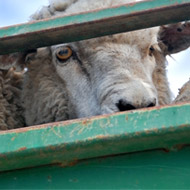Welfare concerns over live animals in transit

Exports of live cattle, pigs and sheep have tripled in value over the past five years.
A BBC programme has found livestock hauliers are ‘routinely breaking EU laws’ put in place to protect animals in transit, during long journeys across Europe.
Welfare charities in Bulgaria, an EU entry point to Turkey and the Middle East, have been monitoring the situation.
When the BBC’s Victoria Derbyshire programme looked into their concerns, they saw ‘widespread’ health issues in animals being transported to Turkey - including respiratory problems, eye conditions, dehydration and exhaustion. One bull was found dead on the top deck of a vehicle while the driver waited to collect customs papers on the Turkish border.
Last month the BBC says it witnessed a truck of 500 sheep getting stuck between checkpoints for four days, in high temperatures with no access to food and water. One sheep was dead when the truck was unloaded in Turkey.
Reporters also saw evidence that European consignments of animals regularly record the wrong destination in journey logs when they enter Turkey. Once they are over the border, livestock is often re-routed to slaughterhouses hundreds of miles away - a practice that is illegal under EU law, which requires animals be rested in stables for 48 hours first.
UK exports of live animals is a booming trade - exports of live cattle, pigs and sheep have tripled in value over the past five years. Cattle and sheep exports from Europe to non-EU countries (which may have lower animal welfare standards) have have doubled in value since 2012, according to figures quoted by the BBC.
EU commissioner for health and food safety, Vytenis Andriukaitis, said the BBC’s findings were “absolutely cause for concern” but he believes the problem does not lie in lack of legislation, but in issues with enforcement, the level of official control and the education of operators involved in live animal transport.
A fact-finding mission has been sent to the Bulgarian border in a bid to address these problems, he added.
A spokesperson from the UK government told the BBC it would "consider the option to limit journey times involving farm animals for slaughter once Britain has left the EU".



 The latest
The latest